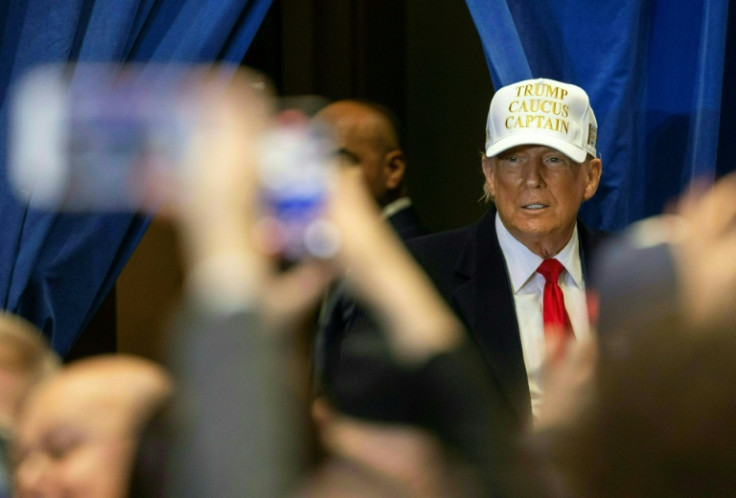
Donald Trump romped to a landslide victory Monday in Iowa's caucuses -- the first vote in the US presidential race -- cementing his status as the presumptive Republican standard-bearer to challenge President Joe Biden in November's election.
The former president has led polling for more than a year, but the contest offered the clearest insight yet into his ability to convert that advantage into a stunning White House return.
Major US networks took just half an hour to call the race, with Trump taking 51 percent of the vote and opening an unprecedented 30-point gap over Ron DeSantis -- the biggest victory for an Iowa challenger in modern history.
The Florida governor and Trump's other main rival -- former UN ambassador Nikki Haley -- were locked at 21 and 19 percent respectively, with DeSantis projected to take the runner-up spot.
"Trump is the dominant candidate (in the Republican Party) and 'contest one' confirms the reality," Julian E. Zelizer, professor of Public Affairs at Princeton University, told AFP.
There had been questions whether Trump would be hamstrung by his legal problems, as he faces multiple civil and criminal trials this year.
But the extent of his victory demonstrated the 77-year-old's success in turning his prosecutions into a rallying cry that has galvanized his followers as he takes his momentum into New Hampshire, the next state to nominate, next Tuesday.
"I really think this is time now for everybody, the country, to come together," Trump said in a rambling, uncharacteristically lackluster victory speech.
Heart doctor Allan Latcham, 62, who voted before heading to Trump's election party in Des Moines, hailed a "night for victory," although he admitted he was surprised by the speed of the result call.
Bundled up Iowa residents shuffled into more than 1,600 voting locations, braving sub-zero temperatures in a winter storm that dulled turnout and forced candidates to cancel events at the last minute.
The margin of Trump victory was always the main question of the night, with analysts arguing that a gap of more than 30 points, or a voting share upwards of 50 percent, would count as a good night.
The Trump machine is better organized than when he lost Iowa in 2016, with boots on the ground across the early nominating states.
A strong showing was seen as essential for DeSantis, who wooed voters in all 99 counties, and was hoping to run Trump close and to reel him in later in the year as the former president's legal woes pile up.
DeSantis confirmed that he would stay in the race to "reverse the madness that we've seen in this country" -- although the governor is considered weak in New Hampshire and many analysts were declaring his campaign all but dead.
"Big winner tonight? Biden. He's gonna get the candidate he wants: Trump," Republican political consultant Mike Madrid posted on social media.
Haley, the only woman in the Republican contest, was looking to outperform expectations in Iowa and ride into a one-on-one match-up with Trump in her preferred battleground of New Hampshire.
Despite her third place finish, Haley dismissed DeSantis's chances of building on his Iowa support level, and she vowed to avert the "nightmare" of a Trump-Biden rematch by winning in New Hampshire.
Trump aides have been clear they want to see off the competition long before the Republican National Convention in July -- and are keen for the party to coalesce around the front-runner before multiple expected court dates.
But some Republican voters said they could not back another Trump presidency.
"I can hardly even think about it. He's a mess. An embarrassment," said Heather Jacobus, who voted for Haley in Des Moines.
Caucuses were also being held by Iowa's Democrats, along with voting by mail until March, with Biden facing two challengers but no serious threat.
"Looks like Donald Trump just won Iowa. He's the clear front runner on the other side at this point," Biden said on X, formerly Twitter.




